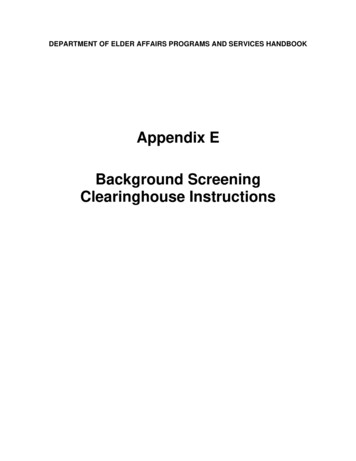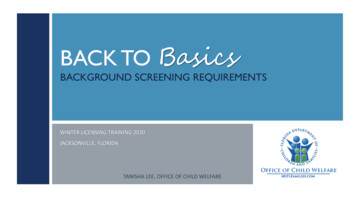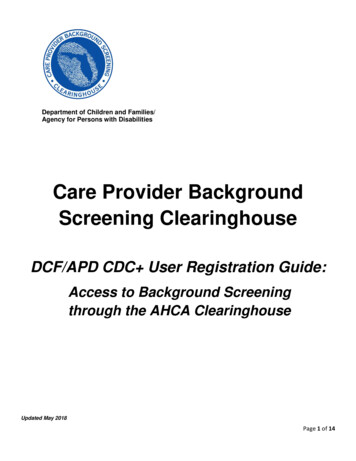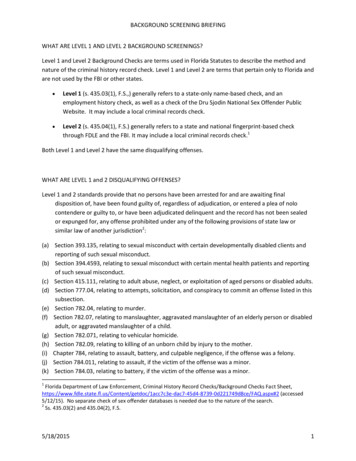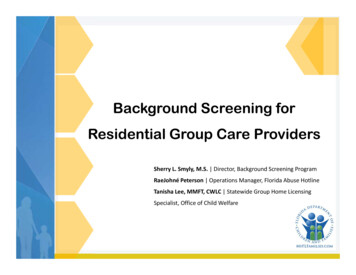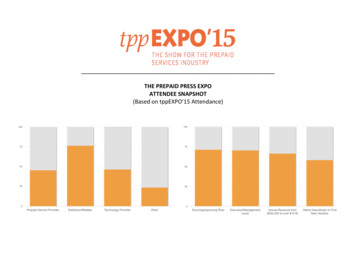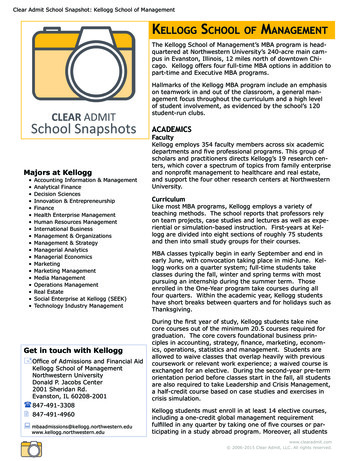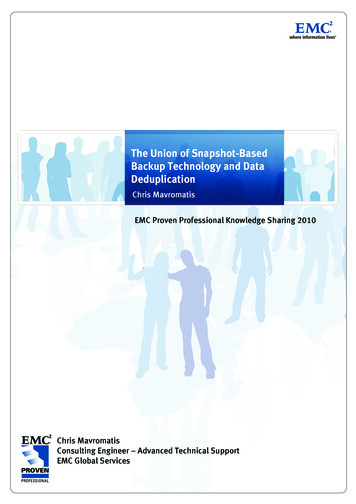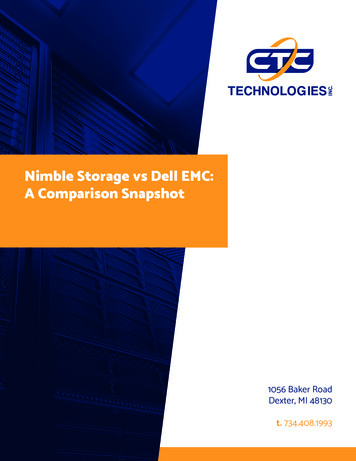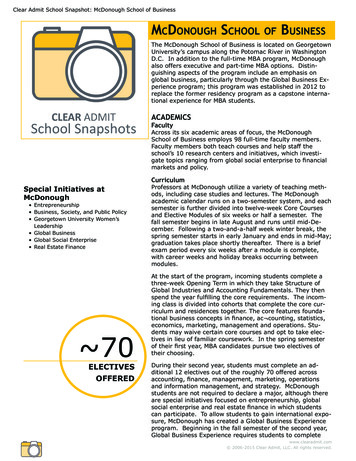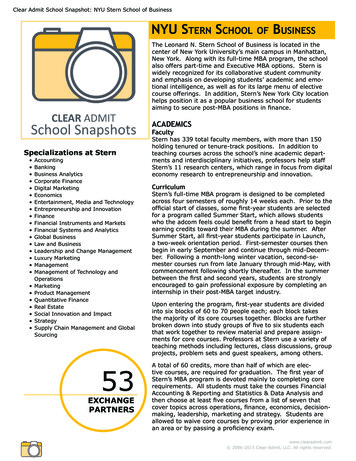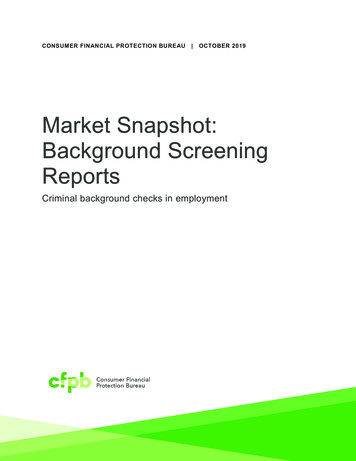
Transcription
CONSUMER FINANCIAL PROTECTION BUREAU OCTOBER 2019Market Snapshot:Background ScreeningReportsCriminal background checks in employment
Table of ContentsTable of Contents . 11. Introduction . 22. Industry Structure . 33. Background Screening Reports – the Process . 74. Challenges . 95. Developments . 161CONSUMER FINANCIAL PROTECTION BUREAU
1. IntroductionEmployers 1 use background screening reports 2 to evaluate prospective and current employeesfor employment, promotion, reassignment, or retention. 3 Background screening reports mayinclude many types of information, including credit history, public records from civil courtproceedings – such as bankruptcy filings and other court documents – and information relatedto employment history. They may also include other public record information on arrests andconvictions of individuals. According to the most recent survey of state criminal historyinformation, “[f]ifty states, Guam, and Puerto Rico report the total number of persons in theircriminal history files as 110,235,200.” 4Employment screening companies provide information such as credit history, employment,salary, education, and professional license verification to employers and others. They may alsocollect, evaluate, provide, or make available criminal arrest and conviction information; drivingrecord information; drug and alcohol testing and health screening information; and non-profitand volunteer activity verification.The Federal Trade Commission (FTC) and the Consumer Financial Protection Bureau (CFPB)both enforce the Fair Credit Reporting Act (FCRA), 5 which includes provisions related to theinclusion and use of criminal history information. The CFPB has general rulemaking authority1The terms “employers”, “users” and “requestors” of reports will be used interchangeably in this report. “Applicants”and “individuals who are the subject of the request” will be used interchangeably.Background screening reports are generally prepared by background screening companies that are consumerreporting agencies and therefore subject to the requirements of the Fair Credit Reporting Act (“FCRA”).2315 U.S.C. §1681a(h).4 BECKI R. GOGGINS & DENNIS A. DEBACCO, SURVEY OF STATE CRIMINAL HISTORY INFORMATIONSYSTEMS, 2016 : A CRIMINAL JUSTICE INFORMATION POLICY REPORT, Dep’t of Justice, Office of JusticePrograms 2 (2018)[hereinafter 2016 Criminal History Survey] available 6.pdf (Dep’t of Justice, Office of Justice Programs) (fifty states,Guam and Puerto Rico report the total number of persons in their criminal history files as 110,235,200, of which105,927,700 are automated records and 4,307,500 are manual records.) However, the estimate generally used is 70million to 100 million individuals with criminal records to account for individuals that may have records in more thanone state. For an example of a methodology accounting for the duplication, see Michelle Natividad Rodriguez andMaurice Emsellem, 65 Million ‘Need Not Apply’: The Case For Reforming Criminal Background Checks ForEmployment, National Employment Law Project (2011), http://www.nelp.org/page/-/SCLP/2011/65 Million Need Not Apply.pdf?nocdn 1 interpreting the BUREAU OF JUSTICE STATISTICS,SURVEY OF STATE CRIMINAL HISTORY INFORMATION SYSTEMS 2014: CRIMINAL JUSTICE INFORMATIONPOLICY 2 (2015) available at pdf5215 U.S.C. §1681 et seq.CONSUMER FINANCIAL PROTECTION BUREAU
over most of the FCRA. 6 The FTC and the CFPB provide educational materials to help consumerreporting companies, users of consumer reports, and consumers understand their rights andresponsibilities under the FCRA. 7 Both the FTC and the CFPB work to ensure accuracy andcompleteness of information in consumer reporting company files. For example, the agenciesfiled a joint amicus brief in 2013 addressing when the seven year allowable reporting periodunder the FCRA commences for certain criminal history information. 8This report describes (i) the background screening industry; (ii) how background screeningreports, including criminal history information, are generated; (iii) how screening reports areused by employers; (iv) challenges related to accuracy and dispute resolution, and (v)developments in the market. While background screening reports can include various types ofinformation and be used for several purposes, this paper focuses on reports used foremployment purposes that include criminal history information.2. Industry StructureThe background screening industry has grown over the past two decades. 9 Following theSeptember 11, 2001 terrorist attacks, the monthly volume of criminal history check requests toone major firm providing multi-state criminal history checks increased from about 3,000 toalmost 25,000 by February 2002. 10 According to a 2016 human resource industry survey,approximately 72 percent of employers surveyed conduct background checks; 82 percent of615 U.S.C. § 1681s(e).7See, e.g., Federal Trade Commission, Background Checks: What Employers Need to know;Consumer Financial Protection Bureau, Focus on Reentry Companion Guide, section 6, Background Screeningreports available at rces/your-money-your-goals/companionguides/.8 See Moran v. The Screening Pros, LLC, No. 12-57246, Ninth Circuit, Brief of Amici Curiae Consumer FinancialProtection Bureau and Federal Trade Commission supporting reversal available e/amicus/briefs/moran-screening-pros-llp/.9 U.S. GOV’T ACCOUNTABILITY OFFICE, GAO 15-162, CRIMINAL HISTORY RECORDS: ADDITIONAL ACTIONSCOULD ENHANCE THE COMPLETENESS OF RECORDS USED FOR EMPLOYMENT-RELATED BACKGROUNDSCREENING BACKGROUND CHECK 33, note 8 (2015) [hereinafter GAO Report] available athttps://www.gao.gov/products/GAO-15-162 (number of private companies conducting criminal record backgroundchecks appears to be increasing because of employer demand).10 Ann Davis, Firms Dig Deep Into Workers’ Pasts Amid Post-Sept. 11 Security Anxiety, Wall St. J. (updated March 12,2002), 3CONSUMER FINANCIAL PROTECTION BUREAU
those that conduct background checks include criminal background checks. 11 A 2018 survey ofemployers, commissioned by the background screening industry, found 95 percent of employerssurveyed stated they conduct one or more types of background screening; 94 percent of thoseemployers that conduct background screening include some form of criminal history check. 12State and federal law require criminal background checks for certain types of jobs or industries,including those working with the elderly, children or other vulnerable populations. 13 Those lawsoften require FBI criminal background checks, which require fingerprints to be submitted, forcertain types of positions, volunteers, and organizations. While there is some overlap in termsof the industry and challenges, such criminal checks are outside the scope of this paper.An industry analysis characterizes the background screening industry as mature and growing,experiencing consolidation and price competition. 14 According to the analysis, three key driversof growth are 1) increased demand due to improvements in the labor market, 2) a decline in therental vacancy rates, and 3) the continuing increase of online services. 15 The analysis estimatesthat for 2019 there are 1,954 background screening companies 16 with revenue of 3.2 billion;two firms account for fourteen percent of the industry’s revenue. 1711 Morethan 1 in 4 Employers Do Not Conduct Background Checks of All New Employees (November 17, ressreleasesdetail.aspx?sd 11/17/2016&siteid cbpr&sc cmp1 cbpr975 &id pr975&ed 12/31/2016; see also Society for Human Resource Management (SHRM), BackgroundChecking – The Use of Criminal Background Checks in Hiring Decisions (2012) (69 percent of the 300 membercompanies and 285,000 individual members polled reported conducting criminal background checks on at least somejob applicants), available l Association of Professional Background Screeners (NAPBS), How Human Resource Professional View theUse and Effectiveness of Background Screening Methods (2018)(HR.com was commissioned by NAPBS to conductthe survey of 2,137 human resource professionals) available athttps://www.hr.com/en/resources/free research white papers/napbs-background-screening-2018jun2018 jiexgh27.html.13 See generally GAO Report, supra note 9, at 10-15 (providing background on state law requirements for FBIbackground checks).14 Evan Hoffman, Background Check Services in the US, IBISWorld Industry Report OD6058 10-11 (April2019)[hereinafter IBISWorld](IBISWorld is publisher of business intelligence reports that specializes in industryresearch). Note: IBISWorld does not consider drug and health screening services as part of the Background CheckServices industry. Id. at 25.15Id. at 3-5.16Id. at 3. See also SEARCH: The National Consortium for Justice Information and Statistics, Report of the NationalTask Force on the Commercial Sale of Criminal Justice Record Information 5 (2005)[hereinafter 2005 Task ForceReport] available at http://www.search.org/files/pdf/RNTFCSCJRI.pdf (The portion of the commercial informationindustry that provides criminal justice information products is difficult to quantify. In addition to a few large industryplayers, there are hundreds, perhaps even thousands, of regional and local companies).174IBISWorld, supra note 14, at 3, 23-24. (First Advantage accounts for 7.4%, Sterling for 6.6% of industry revenue).CONSUMER FINANCIAL PROTECTION BUREAU
Companies that provide consumer reports for employment purposes vary in size, the users theyserve, the services they provide, and the geographic regions they cover. A majority of thecompanies that provide background screening services for users assess applicants foremployment or tenant screening purposes. The industry analysis for 2019 estimates that 32.1percent of revenue in the background screening industry will come from prospective tenantreports, and the remainder of revenue will mostly come from reports requested by employersand businesses. 18Some background screening companies only provide employment screening services; otherssolely tenant screening; and others provide both. 19 Criminal record check services as part ofbackground screening account for 36.5 percent of industry revenue; credit check servicesaccount for 46.4 percent; and reference check services 17.1 percent. 20 With the growth ofdigitized and online access to public records, some companies, including even some smallercompanies, can offer national criminal searches. 21 Background screening companies typicallyprovide a variety of other services, including education and employment verification, creditchecks, identity checks, driving records checks, and form I-9 US employment eligibilityverification. 22Based on information on company websites, some background screening companies state thatthey use official court repositories from each relevant jurisdiction; others rely on privatedatabases of public criminal records information, either run internally or by third parties, whichmay be national in scope or state/county specific. 23 Background screening companies often also18Id. at 14-15. The data includes requests by businesses for reports used for employment purposes as well as reportsused to assess certain customers.19See, e.g., TransUnion SmartMove https://www.mysmartmove.com/; MyRental (owned by CoreLogic)https://www.myrental.com/; and Tenant Background Search https://www.tenantbackgroundsearch.com/ (tenantscreening); AccuSource https://accusource-online.com/; Hireshield.com https://hireshield.com/; and DataCheckhttps://www.datacheckinc.com/default.php (employment screening); ChoiceScreeninghttps://www.choicescreening.com and SentryLink https://www.sentrylink.com/ (employment and tenant screening).20IBISWorld, supra note 14, at 12-13.21See, e.g., AccuSource, Court Records, services/court-records/;iprospectcheck, The Power of Your Own Custom-Built Screening checks-screening/; Corra Group, Background Checks & PreEmployment Screening, rds.html; Employment BackgroundInvestigations, Inc., Background Check Services, /criminalrecord-checks.22See National Association of Professional Background Screeners (NAPBS), The Facts About Background 2D3-A1F2-C4970C002321.23See, e.g., Validity Screening all-solutions/criminal-records/(search includes official court repositories for each identified jurisdiction of residence); CoreLogic5CONSUMER FINANCIAL PROTECTION BUREAU
use third party companies that provide “runner” services or may have those services in-housethat will search individual courthouse records directly. 24 Some large companies that maintainnational databases for their own use sell access to their databases to other companies. 25Background screeni
September 11, 2001 terrorist attacks, the monthly volume of criminal history check requests to one major firm providing multi-state criminal history checks increased from about 3,000 to almost 25,000 by February 2002. 10. According to a 2016 human resource industry survey , approximately 72 percent of employers surveyed conduct background checks; 82 percent of . 6 15 U.S.C. § 1681s(e). 7. See .
